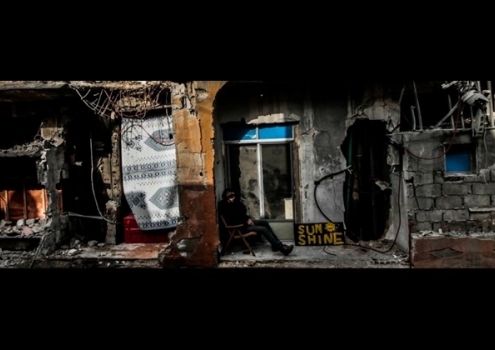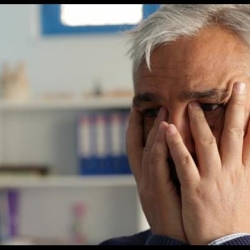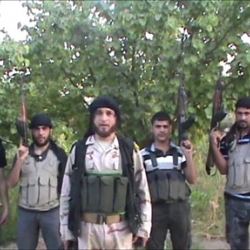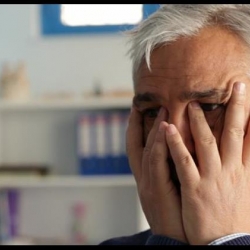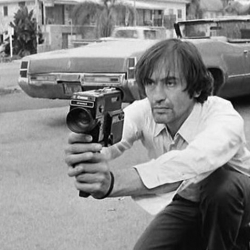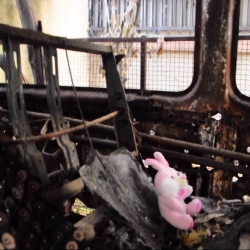Link to the article: here
DOHA: In 2012 a young Tunisian woman went to a nightclub to party with some friends. There she met a young man and they eventually left together. Later three policemen found the couple kissing and, after extorting money from him, the three found it fit to rape her repeatedly.Traumatized, the young woman struggled to have doctors document her attackers’ semen so she could press charges. She persisted on this course throughout the night, despite the personal indifference and institutional obstacles she encountered.
This incident from early in Tunis’ revolution is fictionalized in Kaouther Ben Hania’s 2017 feature “Beauty and the Dogs.” The writer-director’s second feature-length fiction, “Beauty” will have its world premiere at Cannes next month, screening in the Un Certain Regard program.
Last month, The Daily Star caught up with Ben Hania and her Tunisian producers Habib Attia and Nadim Cheikhrouha at the third edition of Qumra – the Doha Film Institute’s film incubation platform for young filmmakers.
Though “Beauty” is a Tunisian film, Ben Hania insists this story could have occurred anywhere, and regularly does.
“The film doesn’t concern Tunis alone,” Cheikhrouha said. “It’s universal. It’s a problem of institutions.”
Rape, and the complex of shame and recrimination that often prevents women from finding justice after being assaulted, has found several cinematic reflections recently. Asghar Fahadi’s Oscar-winning “The Salesman” ruminates on the aftermath of a rape.
Ben Hania herself points to Kirby Dick’s “The Hunting Ground,” documenting an epidemic of sexual assault among U.S. college students.
“It’s the same story,” she said. “Here the institution is a big university. The girl wants to complain but the boy is a big football star so they don’t want to hear about it, to save the school’s reputation.”
“Beauty” arrived at Qumra with most of its budget already secured, Attieh said, from a host of international co-producers (including Lebanon-based Shortcut Films, the latest venture of Abbout Productions founder Georges Schoucair) as well as strong support from the Tunisian state.
Looking ahead to getting the film seen, the producers and director met distributors, festival representatives, broadcasters and Video on Demand platforms. All three agreed that Qumra was a very useful exercise.
“The industry people here are really high quality,” Attia said, “and we have a chance to actually meet them.”
“The event is the right size,” Cheikhrouha added. “You can find these people at some important festivals but you have difficulty approaching them. Here it’s the right dimension. More intimate.”
“I think it’s gonna change the life of the film,” Attia added with a smile, “hopefully.”
This cautious enthusiasm wasn’t misplaced, it seems.
Ben Hania’s work has the advantage of regional and international recognition. After its Middle East premiere her first feature, “Challat Tunis,” 2013, was picked up for a festival reboot at Cannes. The writer-director has also released a pair of celebrated feature-length documentaries. “Zeinab Hates the Snow,” 2016, won a bushel of prizes, including Carthage’s top prize, the Golden Tanit.
Since it was founded in 2010, DFI has become a significant player in the film industry of the Middle East and North Africa. Its financing, film training and development programs have intelligently elaborated upon funding, co-production and post-production models first instituted in this region by the Dubai and (now defunct) Abu Dhabi film festivals.
The institute’s overseas stature has grown on the strength of the regional and international titles it’s helped incubate. It also aims to support the growth of Qatar’s film community.
In practice that’s meant cultivating Qatari filmmakers as well as audiences for locally grown work that may aspire to something beyond commercial cinema convention. Dozens of the country’s aspiring cineastes have since explored filmmaking and some promising work has emerged.
Among the completed Qatari projects foregrounded at Qumra 2017 was “I Have Been Watching You All Along,” a 10-minute short by director, screenwriter, cinematographer and editor Rawda Al Thani.
“Watching” is a series of dialogue-free tableaux of a young woman who escapes the restrictions of her life to explore an abandoned cinema. Among the forgotten film reels, she finds copies of Lotte Reiniger’s “Cinderella” and “Thumbelina,” a pair of jewel-like experimental miniatures from 1922.
It’s a startlingly mature-looking work for a freshman filmmaker in her early 20s. In its implied backstory and setting (Doha’s shuttered Gulf Cinema was the primary location), “Watching” is local, while its course and aesthetic – a cinema history replete with nostalgia for the materiality of film – is cosmopolitan.
It is, in short, a well-crafted showcase for DFI’s mission. Thani developed the short during a Qumra workshop mentored by Palestinian auteur Kamal al-Jafari, along with U.S. cinematographer Chris Turiello and well-known Egyptian editor Hisham Saqr.
Thani’s short was among the titles to come up during a press roundtable with DFI CEO Fatma al-Remaihi, Palestinian filmmaker Elia Suleiman, Qumra’s artistic adviser, and Hannah Issa, the institute’s director of strategy and development. Dominating the conversation was the changes digital production and distribution have wrought to the filmmaking landscape. While players like Hulu and Amazon were absent from Qumra this year, web content providers Netflix, iflix, Mubi and Under the Milky Way were on hand.
“The projects that arrive at Qumra ... have already gone through a journey with us,” Issa said. “We’re on journeys with web content, series, understanding and leveraging and forging relationships with digital distribution, and marketing.”
“The industry is changing,” Remaihi observed. “No one can deny how strong the digital presence is. It’s important for our filmmakers to start working and developing work for these platforms.”
Suleiman counseled guarded optimism about the future.
“There’s always the fear that this thing is gonna swallow you up, it’s so humongous ” he said. “If we do it right, it’s good to use [digital producers and distributors] for what the young filmmakers need ... The world’s changing, but you don’t let that happen without being alert, without being self-critical, without having the necessary critical tools.”
Since the revolutions of 2011, tidal waves of audio-visual content have been generated in this region. Few are more practically challenging, emotionally taxing and ethically rife that those emerging from Syria.
Among the Syrian documentary projects tabled at Qumra this year, one that poses particular challenges to conventional film production and distribution mechanisms is “Al-Sahra.” Directed by Ghaith al-Haddad and Saeed al-Batal, the work is produced by Mohammad Ali Atassi, who heads the Beirut-based Syrian film-incubation non-profit Bidayyat.
Neither Haddad, Batal nor Atassi were able to attend Qumra, so the film was represented by its artistic adviser, Lebanese artist and filmmaker Rania Stephan.
Stephan describes “Al-Sahra” as the story of the friendship of two young men from Damascus. One of them, Saeed, travels to Douma in eastern Ghouta, where he witnesses and participates in the changing political situation. He immediately begins to document events – demonstrations, massacre, the formation of self-rule and armed brigades, the organization of different factions, the regime’s bombing campaigns, siege and hunger.
“A friend joins Saeed in Douma and their friendship is articulated through these historic events,” Stephan said, “so it’s a document and a documentary.”
Speaking about the project afterward in Beirut, Atassi depicts the project as the story of two artists from minority communities who leave Damascus to be with the people, a story that contradicts media representations of the Syrian crisis.
“In my view,” he said, the film is about “the human dimension of the conflict, the forgotten people on the other side. The film is about engagement and disillusionment.”
Several factors have shaped the development of this unconventional project. One is Bidayyat’s awareness of its positioning as a production house formed in the wake of the 2011 revolution.
Stephan notes all Bidayyat productions ask certain ethical questions. These documentaries are never simply personal narratives, so the filmmakers must consider how they position themselves vis-a-vis the writing of history.
“How do you put the ‘I?’ The ‘we?’” She said. “If I say ‘I’ what does it mean? Will the film have a voice-over or not?”
Bidayyat wants its directors to determine the shape of the work as organically as possible, which means not making decisions on format until editing is done.
“Of course we want the film to be seen,” Stephan said, “but we don’t want to squeeze it into commercial formulae. Articulating all the layers of the film, the questions [it asks], positioning the two directors’ points of the view ... the film’s shape, length and tempo – all that must be done in the editing room.
“Maybe [Al-Sahra] will be two hours long, maybe four hours, five hours, six hours. Maybe [it will be] a series of half-hour episodes.”
The directors are working from 500-odd hours of rushes, shot between 2011 and 2015, and the question remains of where to end the story – whether to follow the characters into exile.
These were among the ground rules Stephan brought to her conversations with the industry when, seven months into post-production, “Al-Sahra” arrived at Qumra looking for co-production and distribution advice.
Stephan was impressed with the possible opportunities new production-distribution models suggested for Bidayyat’s unconventional production strategy.
“You have the old-style distributors that aim to release in the cinema and on television ... [a] landscape that is changing because of online platforms ... like Netflix and Amazon and how they are positioning themselves on the old production landscape.
“Having a sense of the possibilities for making the film visible later was very useful. Do you want festivals? Do you want theatrical release? Do you want an online series? Then it’s up to the directors and producer to decide how they want the film to be pushed and what kind of visibility they want.”
In Beirut, Atassi was visibly torn between the different opportunities offered by traditional and digital distribution.
“For the directors what’s important is [that the film reach] their own people, but you can’t find your own people in Syria ... They are split into refugee communities all over the world. The question is how to reach the Syrian public.”
As producer, he continued, “festivals are important in the beginning because you can have your work evaluated. It’s about recognition as well as visibility ... It’s more important that we take it to the cinema, I think. For the time being I’m not comfortable taking it to Netflix and doing a series. We’ll see.”



